Reflective Personal Development Plan: Skills Assessment & Action Plan
VerifiedAdded on 2024/05/20
|20
|4080
|253
Report
AI Summary
This report presents a reflective personal development plan based on the assessment of four key skills: negotiation, time management, public speaking, and resilience. The skills were appraised using tools like the Johari window, peer-based assessment, and feedback from past academic reports. The assessment revealed strengths in negotiation and resilience, while highlighting a need for improvement in public speaking and time management. The report includes journal entries detailing reflections on each skill, an analysis of current competence, and an action plan outlining specific steps for development. The action plan focuses on addressing weaknesses and leveraging strengths to achieve personal and professional growth, with a conclusion summarizing the key findings and outlining the commitment to continuous self-improvement. Desklib is a great platform to find similar solved assignments.
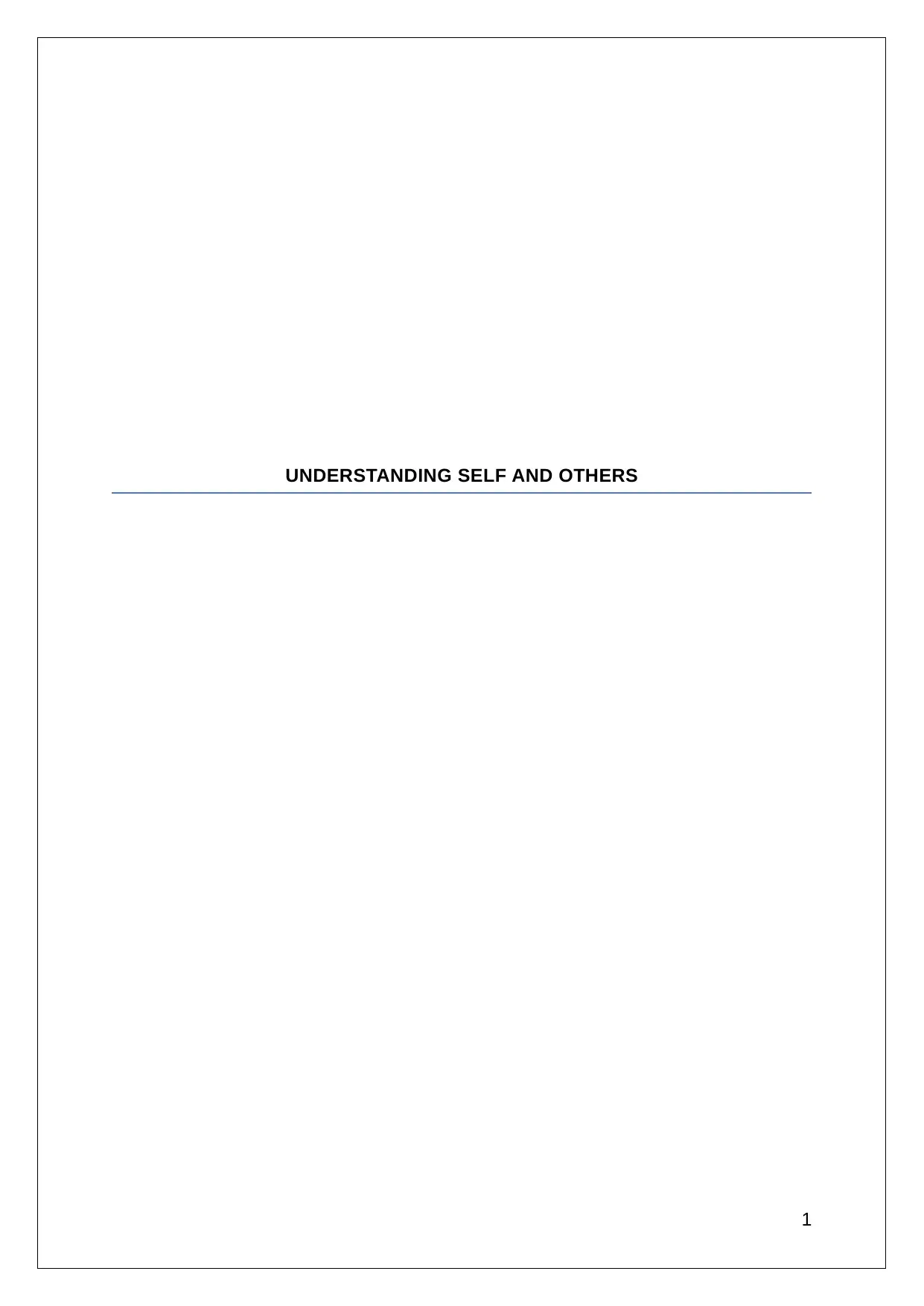
UNDERSTANDING SELF AND OTHERS
1
1
Paraphrase This Document
Need a fresh take? Get an instant paraphrase of this document with our AI Paraphraser
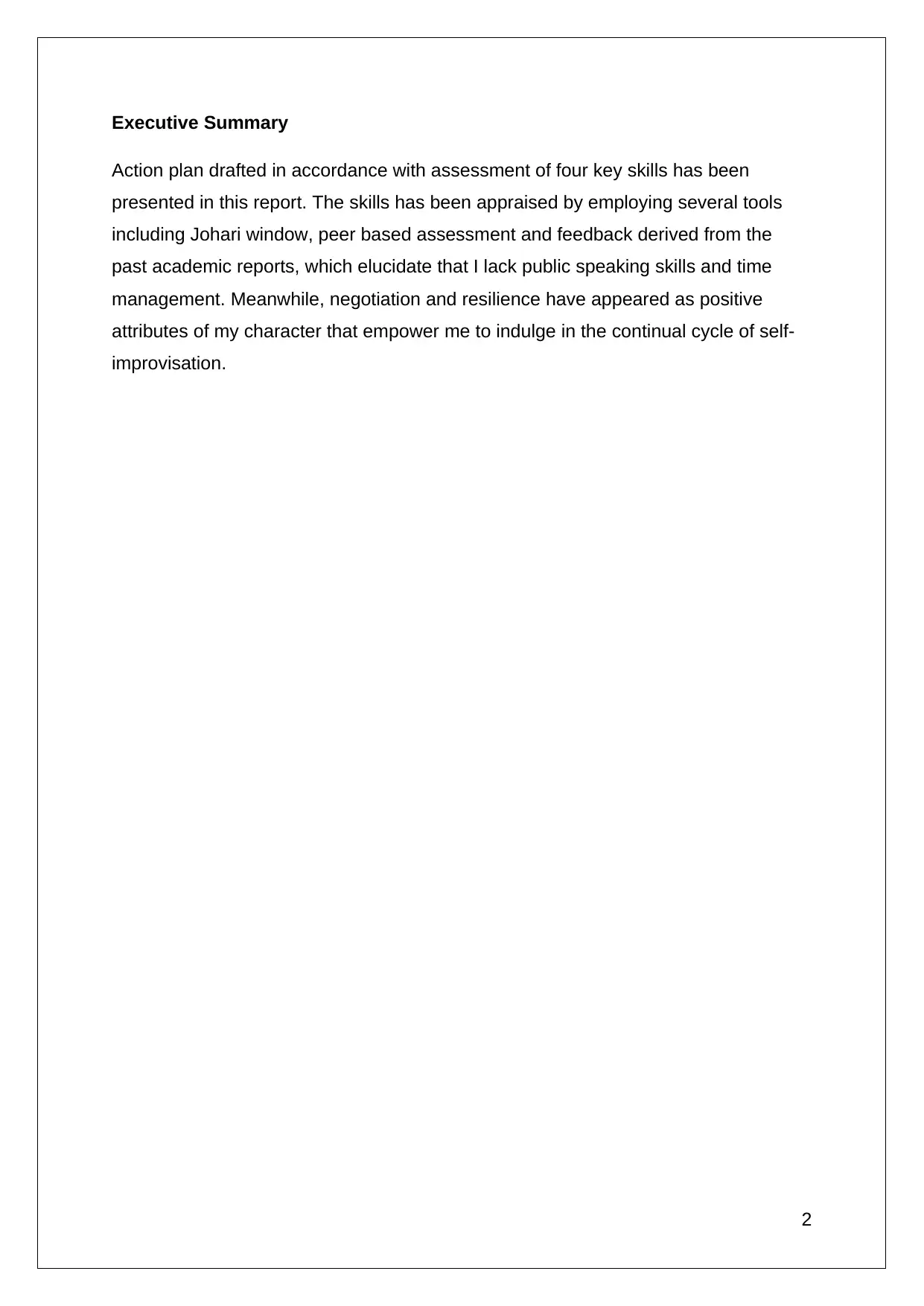
Executive Summary
Action plan drafted in accordance with assessment of four key skills has been
presented in this report. The skills has been appraised by employing several tools
including Johari window, peer based assessment and feedback derived from the
past academic reports, which elucidate that I lack public speaking skills and time
management. Meanwhile, negotiation and resilience have appeared as positive
attributes of my character that empower me to indulge in the continual cycle of self-
improvisation.
2
Action plan drafted in accordance with assessment of four key skills has been
presented in this report. The skills has been appraised by employing several tools
including Johari window, peer based assessment and feedback derived from the
past academic reports, which elucidate that I lack public speaking skills and time
management. Meanwhile, negotiation and resilience have appeared as positive
attributes of my character that empower me to indulge in the continual cycle of self-
improvisation.
2
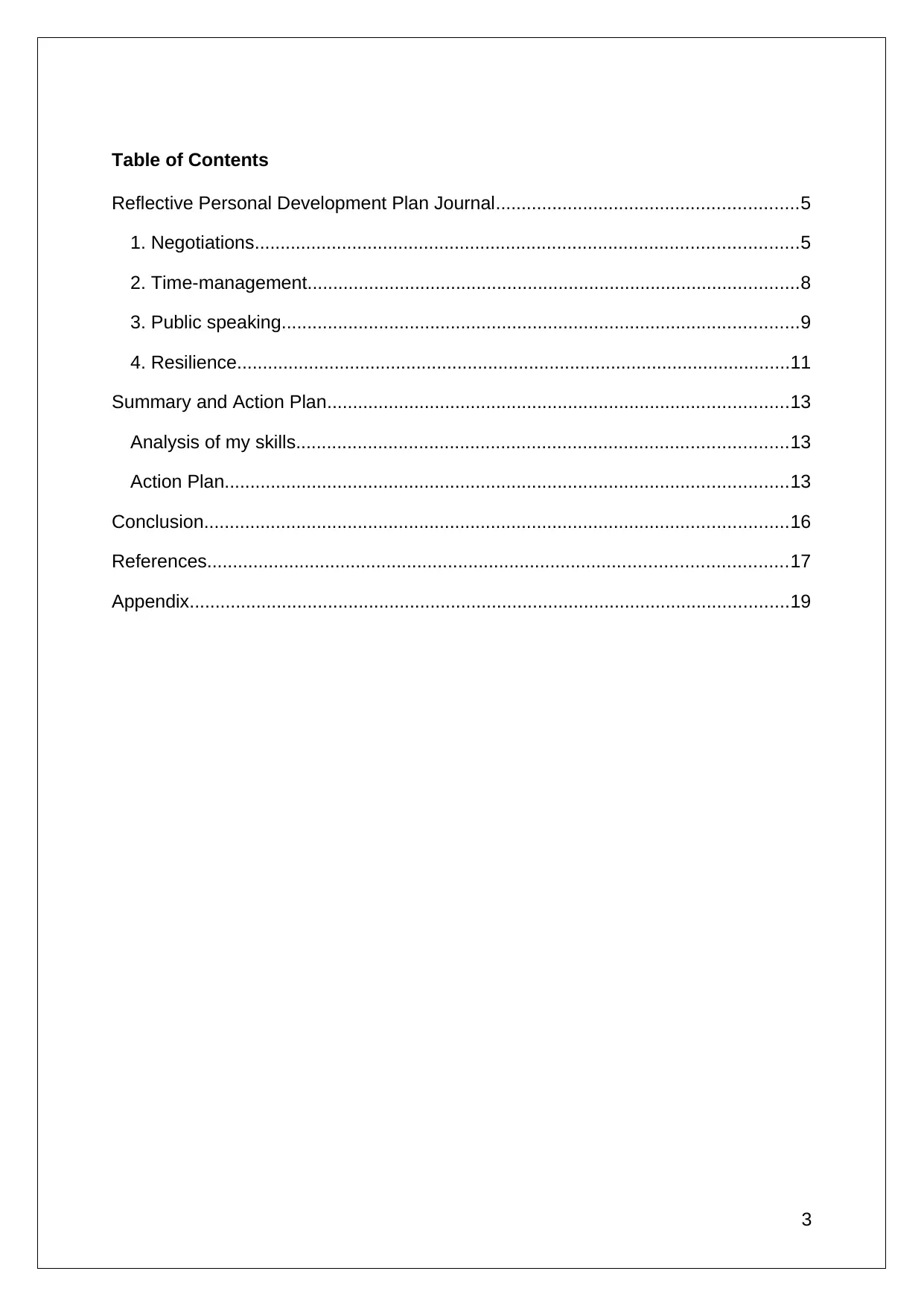
Table of Contents
Reflective Personal Development Plan Journal...........................................................5
1. Negotiations..........................................................................................................5
2. Time-management................................................................................................8
3. Public speaking.....................................................................................................9
4. Resilience............................................................................................................11
Summary and Action Plan..........................................................................................13
Analysis of my skills................................................................................................13
Action Plan..............................................................................................................13
Conclusion..................................................................................................................16
References.................................................................................................................17
Appendix.....................................................................................................................19
3
Reflective Personal Development Plan Journal...........................................................5
1. Negotiations..........................................................................................................5
2. Time-management................................................................................................8
3. Public speaking.....................................................................................................9
4. Resilience............................................................................................................11
Summary and Action Plan..........................................................................................13
Analysis of my skills................................................................................................13
Action Plan..............................................................................................................13
Conclusion..................................................................................................................16
References.................................................................................................................17
Appendix.....................................................................................................................19
3
⊘ This is a preview!⊘
Do you want full access?
Subscribe today to unlock all pages.

Trusted by 1+ million students worldwide
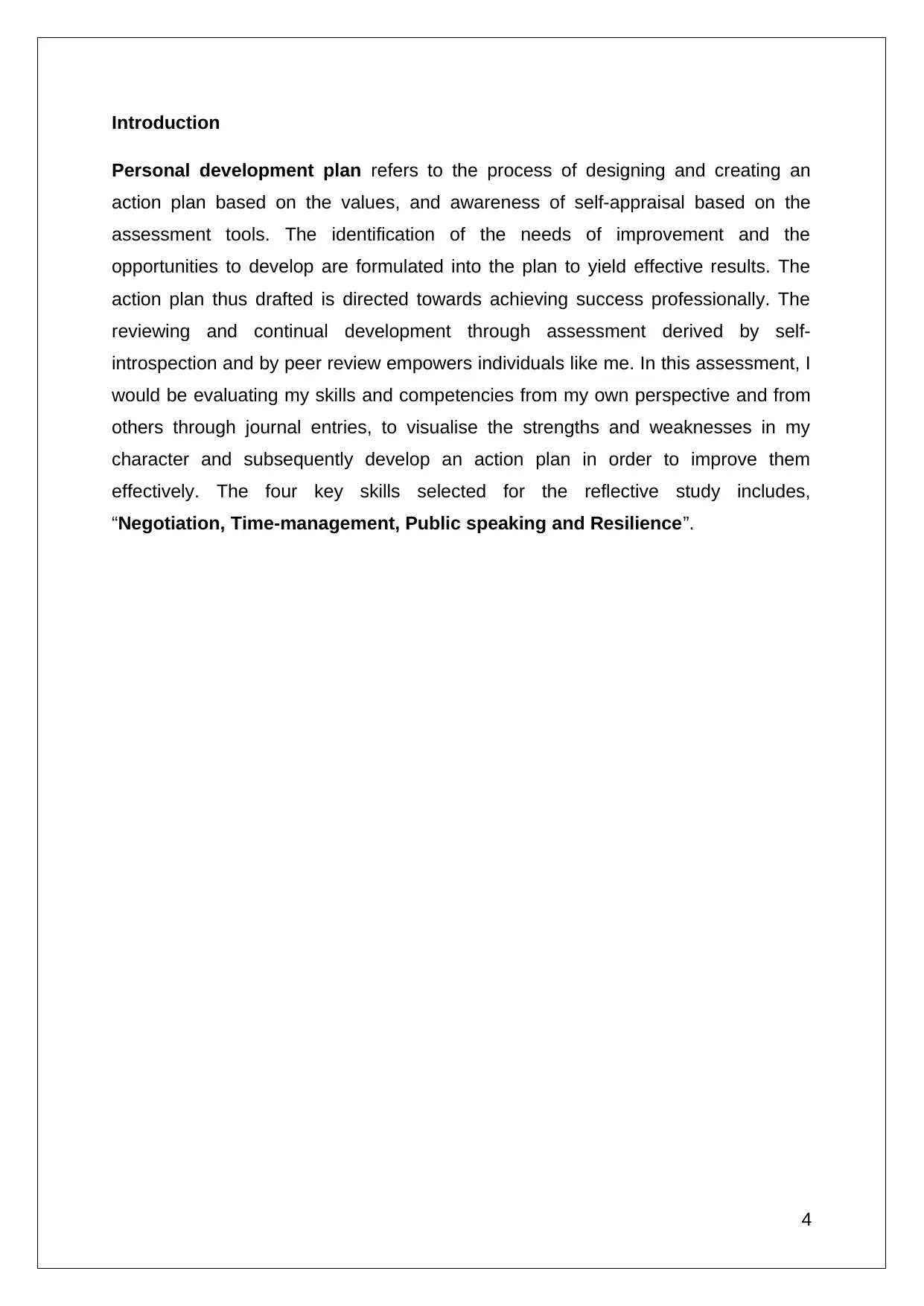
Introduction
Personal development plan refers to the process of designing and creating an
action plan based on the values, and awareness of self-appraisal based on the
assessment tools. The identification of the needs of improvement and the
opportunities to develop are formulated into the plan to yield effective results. The
action plan thus drafted is directed towards achieving success professionally. The
reviewing and continual development through assessment derived by self-
introspection and by peer review empowers individuals like me. In this assessment, I
would be evaluating my skills and competencies from my own perspective and from
others through journal entries, to visualise the strengths and weaknesses in my
character and subsequently develop an action plan in order to improve them
effectively. The four key skills selected for the reflective study includes,
“Negotiation, Time-management, Public speaking and Resilience”.
4
Personal development plan refers to the process of designing and creating an
action plan based on the values, and awareness of self-appraisal based on the
assessment tools. The identification of the needs of improvement and the
opportunities to develop are formulated into the plan to yield effective results. The
action plan thus drafted is directed towards achieving success professionally. The
reviewing and continual development through assessment derived by self-
introspection and by peer review empowers individuals like me. In this assessment, I
would be evaluating my skills and competencies from my own perspective and from
others through journal entries, to visualise the strengths and weaknesses in my
character and subsequently develop an action plan in order to improve them
effectively. The four key skills selected for the reflective study includes,
“Negotiation, Time-management, Public speaking and Resilience”.
4
Paraphrase This Document
Need a fresh take? Get an instant paraphrase of this document with our AI Paraphraser
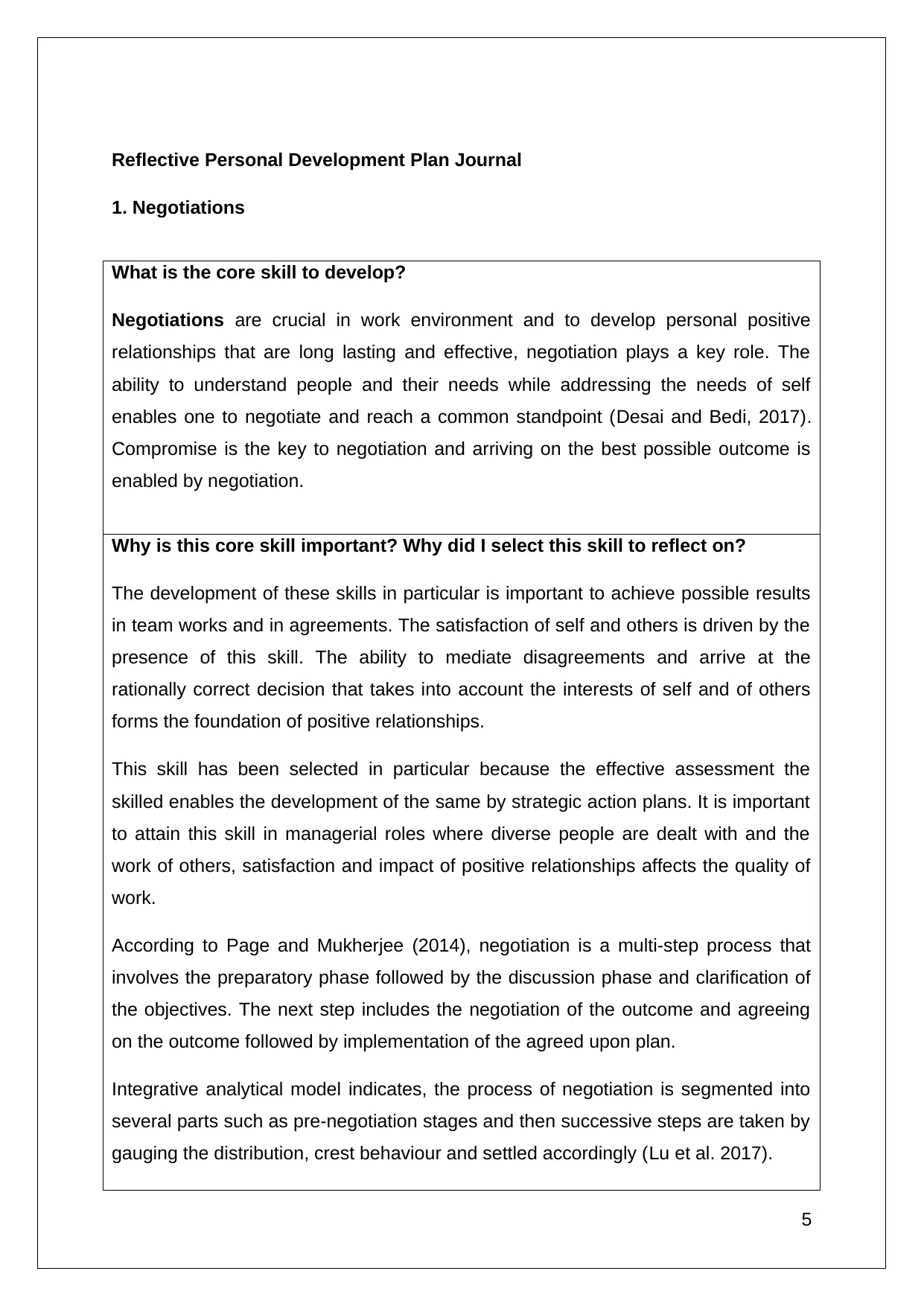
Reflective Personal Development Plan Journal
1. Negotiations
What is the core skill to develop?
Negotiations are crucial in work environment and to develop personal positive
relationships that are long lasting and effective, negotiation plays a key role. The
ability to understand people and their needs while addressing the needs of self
enables one to negotiate and reach a common standpoint (Desai and Bedi, 2017).
Compromise is the key to negotiation and arriving on the best possible outcome is
enabled by negotiation.
Why is this core skill important? Why did I select this skill to reflect on?
The development of these skills in particular is important to achieve possible results
in team works and in agreements. The satisfaction of self and others is driven by the
presence of this skill. The ability to mediate disagreements and arrive at the
rationally correct decision that takes into account the interests of self and of others
forms the foundation of positive relationships.
This skill has been selected in particular because the effective assessment the
skilled enables the development of the same by strategic action plans. It is important
to attain this skill in managerial roles where diverse people are dealt with and the
work of others, satisfaction and impact of positive relationships affects the quality of
work.
According to Page and Mukherjee (2014), negotiation is a multi-step process that
involves the preparatory phase followed by the discussion phase and clarification of
the objectives. The next step includes the negotiation of the outcome and agreeing
on the outcome followed by implementation of the agreed upon plan.
Integrative analytical model indicates, the process of negotiation is segmented into
several parts such as pre-negotiation stages and then successive steps are taken by
gauging the distribution, crest behaviour and settled accordingly (Lu et al. 2017).
5
1. Negotiations
What is the core skill to develop?
Negotiations are crucial in work environment and to develop personal positive
relationships that are long lasting and effective, negotiation plays a key role. The
ability to understand people and their needs while addressing the needs of self
enables one to negotiate and reach a common standpoint (Desai and Bedi, 2017).
Compromise is the key to negotiation and arriving on the best possible outcome is
enabled by negotiation.
Why is this core skill important? Why did I select this skill to reflect on?
The development of these skills in particular is important to achieve possible results
in team works and in agreements. The satisfaction of self and others is driven by the
presence of this skill. The ability to mediate disagreements and arrive at the
rationally correct decision that takes into account the interests of self and of others
forms the foundation of positive relationships.
This skill has been selected in particular because the effective assessment the
skilled enables the development of the same by strategic action plans. It is important
to attain this skill in managerial roles where diverse people are dealt with and the
work of others, satisfaction and impact of positive relationships affects the quality of
work.
According to Page and Mukherjee (2014), negotiation is a multi-step process that
involves the preparatory phase followed by the discussion phase and clarification of
the objectives. The next step includes the negotiation of the outcome and agreeing
on the outcome followed by implementation of the agreed upon plan.
Integrative analytical model indicates, the process of negotiation is segmented into
several parts such as pre-negotiation stages and then successive steps are taken by
gauging the distribution, crest behaviour and settled accordingly (Lu et al. 2017).
5
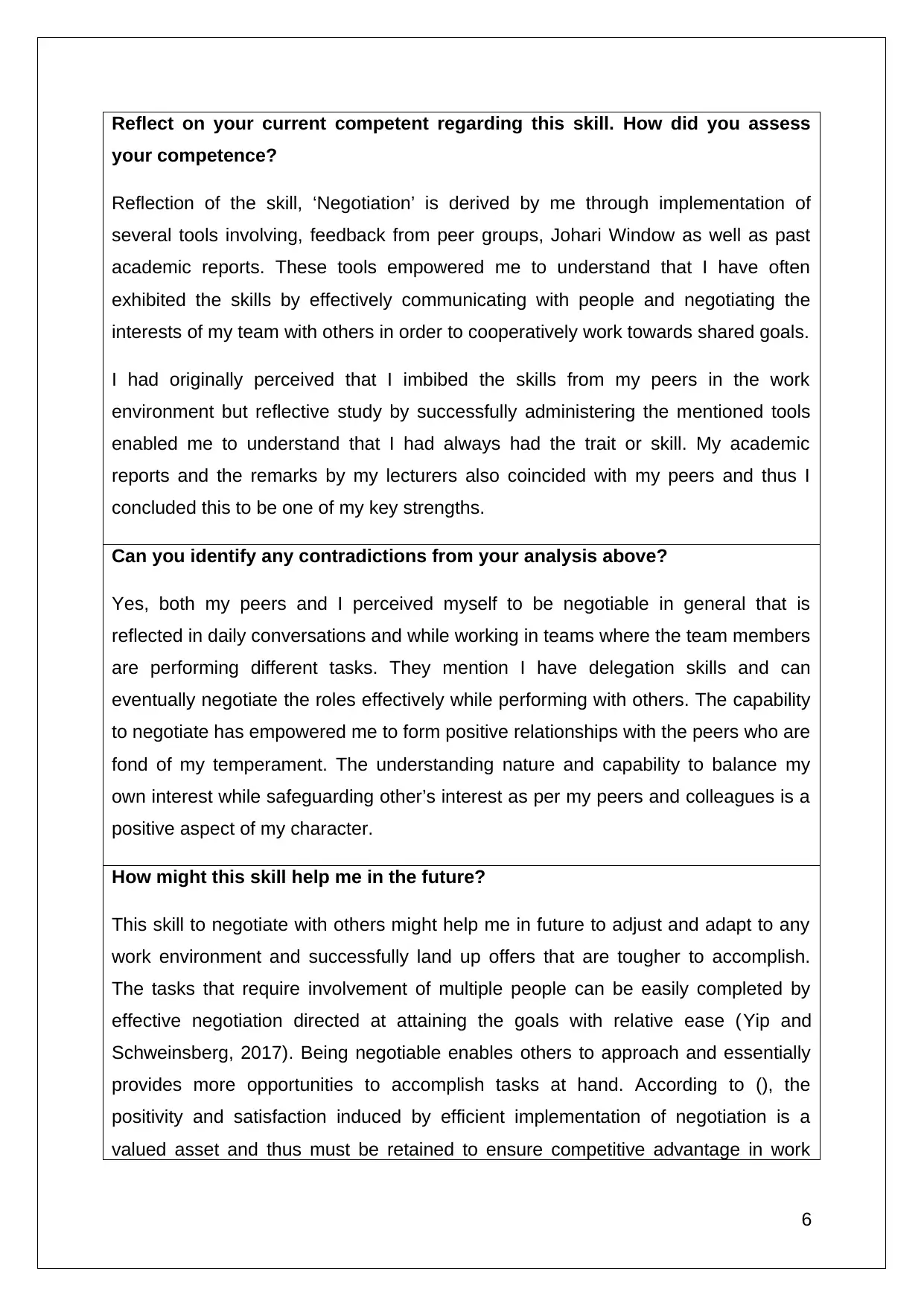
Reflect on your current competent regarding this skill. How did you assess
your competence?
Reflection of the skill, ‘Negotiation’ is derived by me through implementation of
several tools involving, feedback from peer groups, Johari Window as well as past
academic reports. These tools empowered me to understand that I have often
exhibited the skills by effectively communicating with people and negotiating the
interests of my team with others in order to cooperatively work towards shared goals.
I had originally perceived that I imbibed the skills from my peers in the work
environment but reflective study by successfully administering the mentioned tools
enabled me to understand that I had always had the trait or skill. My academic
reports and the remarks by my lecturers also coincided with my peers and thus I
concluded this to be one of my key strengths.
Can you identify any contradictions from your analysis above?
Yes, both my peers and I perceived myself to be negotiable in general that is
reflected in daily conversations and while working in teams where the team members
are performing different tasks. They mention I have delegation skills and can
eventually negotiate the roles effectively while performing with others. The capability
to negotiate has empowered me to form positive relationships with the peers who are
fond of my temperament. The understanding nature and capability to balance my
own interest while safeguarding other’s interest as per my peers and colleagues is a
positive aspect of my character.
How might this skill help me in the future?
This skill to negotiate with others might help me in future to adjust and adapt to any
work environment and successfully land up offers that are tougher to accomplish.
The tasks that require involvement of multiple people can be easily completed by
effective negotiation directed at attaining the goals with relative ease (Yip and
Schweinsberg, 2017). Being negotiable enables others to approach and essentially
provides more opportunities to accomplish tasks at hand. According to (), the
positivity and satisfaction induced by efficient implementation of negotiation is a
valued asset and thus must be retained to ensure competitive advantage in work
6
your competence?
Reflection of the skill, ‘Negotiation’ is derived by me through implementation of
several tools involving, feedback from peer groups, Johari Window as well as past
academic reports. These tools empowered me to understand that I have often
exhibited the skills by effectively communicating with people and negotiating the
interests of my team with others in order to cooperatively work towards shared goals.
I had originally perceived that I imbibed the skills from my peers in the work
environment but reflective study by successfully administering the mentioned tools
enabled me to understand that I had always had the trait or skill. My academic
reports and the remarks by my lecturers also coincided with my peers and thus I
concluded this to be one of my key strengths.
Can you identify any contradictions from your analysis above?
Yes, both my peers and I perceived myself to be negotiable in general that is
reflected in daily conversations and while working in teams where the team members
are performing different tasks. They mention I have delegation skills and can
eventually negotiate the roles effectively while performing with others. The capability
to negotiate has empowered me to form positive relationships with the peers who are
fond of my temperament. The understanding nature and capability to balance my
own interest while safeguarding other’s interest as per my peers and colleagues is a
positive aspect of my character.
How might this skill help me in the future?
This skill to negotiate with others might help me in future to adjust and adapt to any
work environment and successfully land up offers that are tougher to accomplish.
The tasks that require involvement of multiple people can be easily completed by
effective negotiation directed at attaining the goals with relative ease (Yip and
Schweinsberg, 2017). Being negotiable enables others to approach and essentially
provides more opportunities to accomplish tasks at hand. According to (), the
positivity and satisfaction induced by efficient implementation of negotiation is a
valued asset and thus must be retained to ensure competitive advantage in work
6
⊘ This is a preview!⊘
Do you want full access?
Subscribe today to unlock all pages.

Trusted by 1+ million students worldwide
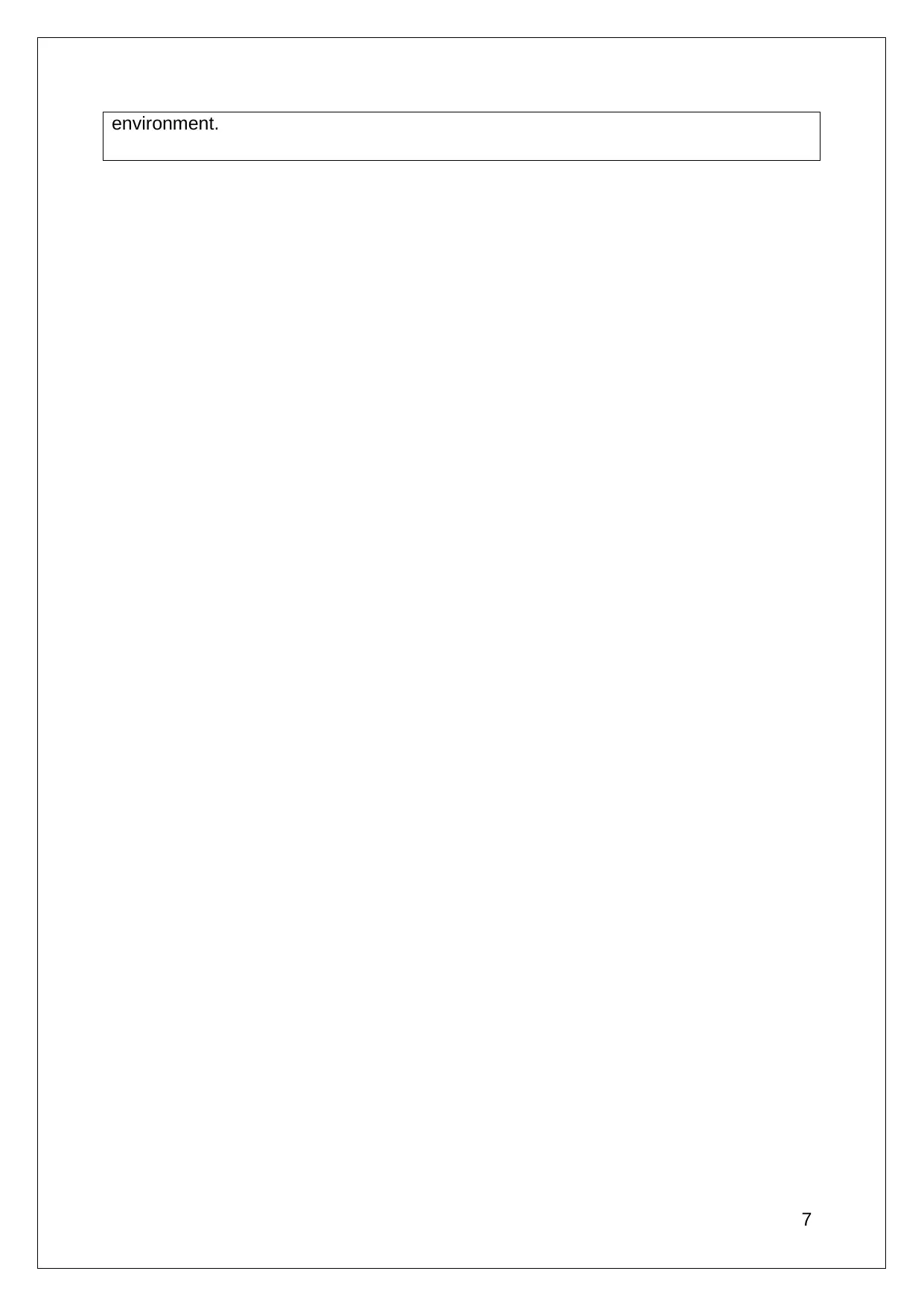
environment.
7
7
Paraphrase This Document
Need a fresh take? Get an instant paraphrase of this document with our AI Paraphraser
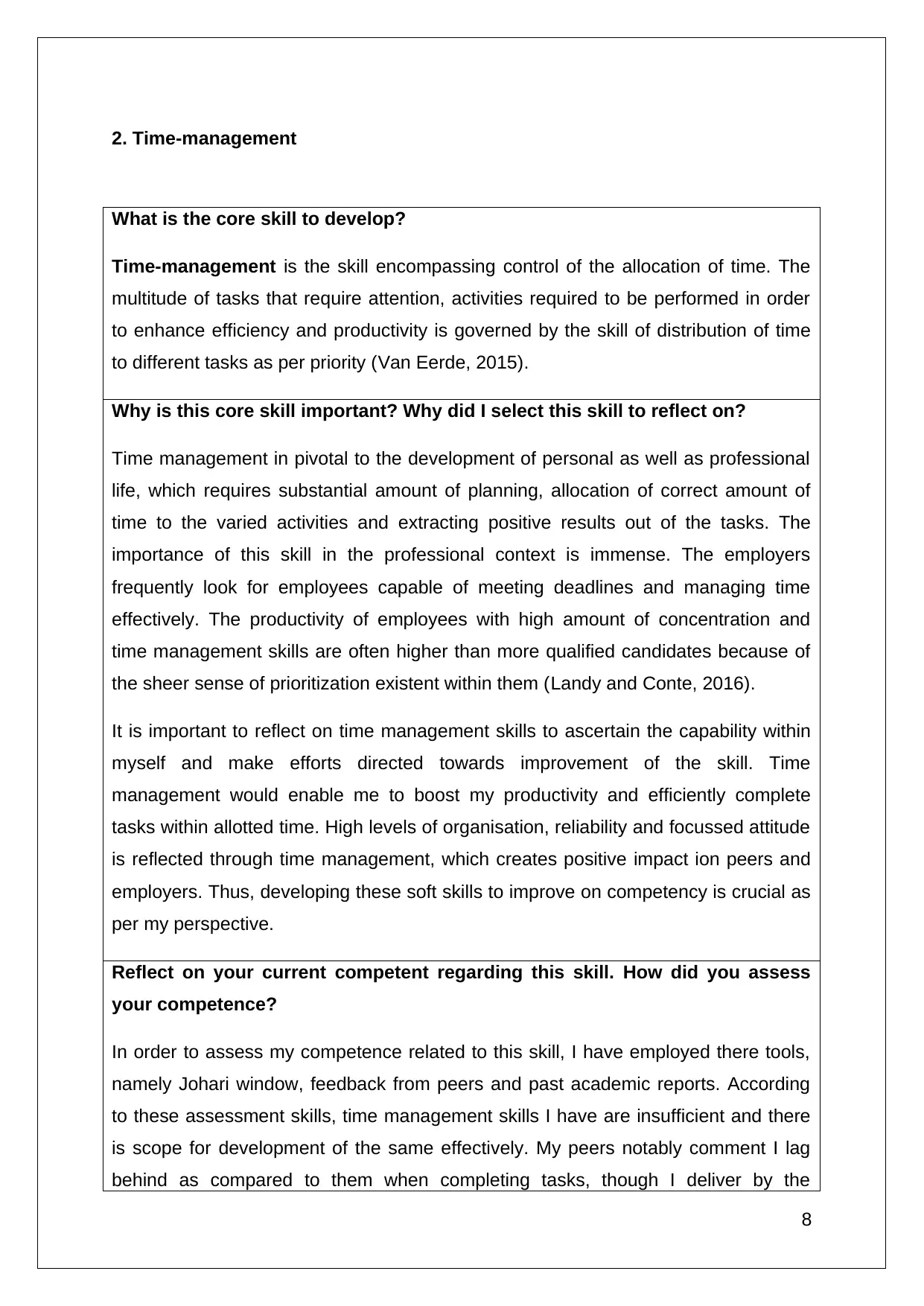
2. Time-management
What is the core skill to develop?
Time-management is the skill encompassing control of the allocation of time. The
multitude of tasks that require attention, activities required to be performed in order
to enhance efficiency and productivity is governed by the skill of distribution of time
to different tasks as per priority (Van Eerde, 2015).
Why is this core skill important? Why did I select this skill to reflect on?
Time management in pivotal to the development of personal as well as professional
life, which requires substantial amount of planning, allocation of correct amount of
time to the varied activities and extracting positive results out of the tasks. The
importance of this skill in the professional context is immense. The employers
frequently look for employees capable of meeting deadlines and managing time
effectively. The productivity of employees with high amount of concentration and
time management skills are often higher than more qualified candidates because of
the sheer sense of prioritization existent within them (Landy and Conte, 2016).
It is important to reflect on time management skills to ascertain the capability within
myself and make efforts directed towards improvement of the skill. Time
management would enable me to boost my productivity and efficiently complete
tasks within allotted time. High levels of organisation, reliability and focussed attitude
is reflected through time management, which creates positive impact ion peers and
employers. Thus, developing these soft skills to improve on competency is crucial as
per my perspective.
Reflect on your current competent regarding this skill. How did you assess
your competence?
In order to assess my competence related to this skill, I have employed there tools,
namely Johari window, feedback from peers and past academic reports. According
to these assessment skills, time management skills I have are insufficient and there
is scope for development of the same effectively. My peers notably comment I lag
behind as compared to them when completing tasks, though I deliver by the
8
What is the core skill to develop?
Time-management is the skill encompassing control of the allocation of time. The
multitude of tasks that require attention, activities required to be performed in order
to enhance efficiency and productivity is governed by the skill of distribution of time
to different tasks as per priority (Van Eerde, 2015).
Why is this core skill important? Why did I select this skill to reflect on?
Time management in pivotal to the development of personal as well as professional
life, which requires substantial amount of planning, allocation of correct amount of
time to the varied activities and extracting positive results out of the tasks. The
importance of this skill in the professional context is immense. The employers
frequently look for employees capable of meeting deadlines and managing time
effectively. The productivity of employees with high amount of concentration and
time management skills are often higher than more qualified candidates because of
the sheer sense of prioritization existent within them (Landy and Conte, 2016).
It is important to reflect on time management skills to ascertain the capability within
myself and make efforts directed towards improvement of the skill. Time
management would enable me to boost my productivity and efficiently complete
tasks within allotted time. High levels of organisation, reliability and focussed attitude
is reflected through time management, which creates positive impact ion peers and
employers. Thus, developing these soft skills to improve on competency is crucial as
per my perspective.
Reflect on your current competent regarding this skill. How did you assess
your competence?
In order to assess my competence related to this skill, I have employed there tools,
namely Johari window, feedback from peers and past academic reports. According
to these assessment skills, time management skills I have are insufficient and there
is scope for development of the same effectively. My peers notably comment I lag
behind as compared to them when completing tasks, though I deliver by the
8
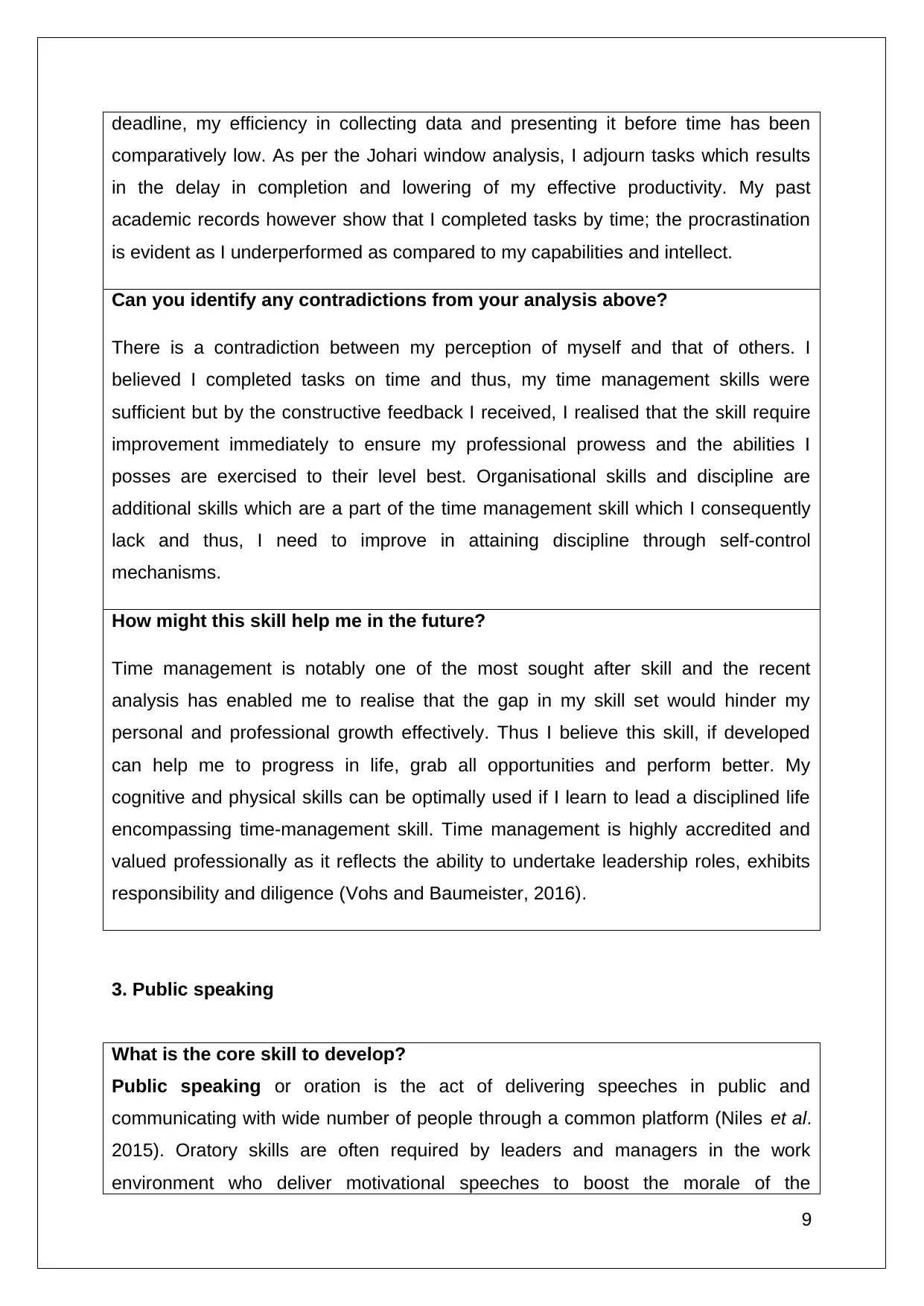
deadline, my efficiency in collecting data and presenting it before time has been
comparatively low. As per the Johari window analysis, I adjourn tasks which results
in the delay in completion and lowering of my effective productivity. My past
academic records however show that I completed tasks by time; the procrastination
is evident as I underperformed as compared to my capabilities and intellect.
Can you identify any contradictions from your analysis above?
There is a contradiction between my perception of myself and that of others. I
believed I completed tasks on time and thus, my time management skills were
sufficient but by the constructive feedback I received, I realised that the skill require
improvement immediately to ensure my professional prowess and the abilities I
posses are exercised to their level best. Organisational skills and discipline are
additional skills which are a part of the time management skill which I consequently
lack and thus, I need to improve in attaining discipline through self-control
mechanisms.
How might this skill help me in the future?
Time management is notably one of the most sought after skill and the recent
analysis has enabled me to realise that the gap in my skill set would hinder my
personal and professional growth effectively. Thus I believe this skill, if developed
can help me to progress in life, grab all opportunities and perform better. My
cognitive and physical skills can be optimally used if I learn to lead a disciplined life
encompassing time-management skill. Time management is highly accredited and
valued professionally as it reflects the ability to undertake leadership roles, exhibits
responsibility and diligence (Vohs and Baumeister, 2016).
3. Public speaking
What is the core skill to develop?
Public speaking or oration is the act of delivering speeches in public and
communicating with wide number of people through a common platform (Niles et al.
2015). Oratory skills are often required by leaders and managers in the work
environment who deliver motivational speeches to boost the morale of the
9
comparatively low. As per the Johari window analysis, I adjourn tasks which results
in the delay in completion and lowering of my effective productivity. My past
academic records however show that I completed tasks by time; the procrastination
is evident as I underperformed as compared to my capabilities and intellect.
Can you identify any contradictions from your analysis above?
There is a contradiction between my perception of myself and that of others. I
believed I completed tasks on time and thus, my time management skills were
sufficient but by the constructive feedback I received, I realised that the skill require
improvement immediately to ensure my professional prowess and the abilities I
posses are exercised to their level best. Organisational skills and discipline are
additional skills which are a part of the time management skill which I consequently
lack and thus, I need to improve in attaining discipline through self-control
mechanisms.
How might this skill help me in the future?
Time management is notably one of the most sought after skill and the recent
analysis has enabled me to realise that the gap in my skill set would hinder my
personal and professional growth effectively. Thus I believe this skill, if developed
can help me to progress in life, grab all opportunities and perform better. My
cognitive and physical skills can be optimally used if I learn to lead a disciplined life
encompassing time-management skill. Time management is highly accredited and
valued professionally as it reflects the ability to undertake leadership roles, exhibits
responsibility and diligence (Vohs and Baumeister, 2016).
3. Public speaking
What is the core skill to develop?
Public speaking or oration is the act of delivering speeches in public and
communicating with wide number of people through a common platform (Niles et al.
2015). Oratory skills are often required by leaders and managers in the work
environment who deliver motivational speeches to boost the morale of the
9
⊘ This is a preview!⊘
Do you want full access?
Subscribe today to unlock all pages.

Trusted by 1+ million students worldwide
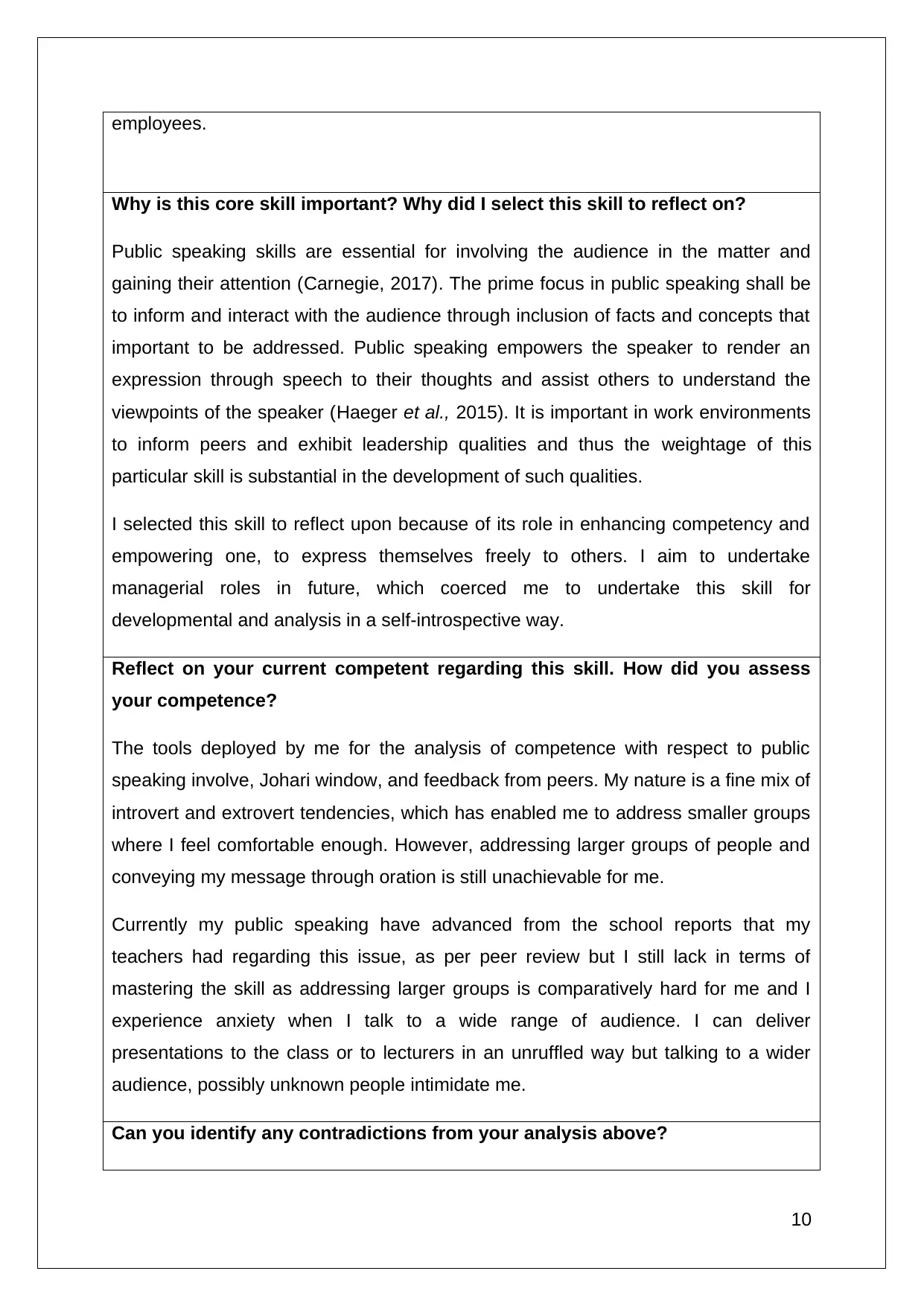
employees.
Why is this core skill important? Why did I select this skill to reflect on?
Public speaking skills are essential for involving the audience in the matter and
gaining their attention (Carnegie, 2017). The prime focus in public speaking shall be
to inform and interact with the audience through inclusion of facts and concepts that
important to be addressed. Public speaking empowers the speaker to render an
expression through speech to their thoughts and assist others to understand the
viewpoints of the speaker (Haeger et al., 2015). It is important in work environments
to inform peers and exhibit leadership qualities and thus the weightage of this
particular skill is substantial in the development of such qualities.
I selected this skill to reflect upon because of its role in enhancing competency and
empowering one, to express themselves freely to others. I aim to undertake
managerial roles in future, which coerced me to undertake this skill for
developmental and analysis in a self-introspective way.
Reflect on your current competent regarding this skill. How did you assess
your competence?
The tools deployed by me for the analysis of competence with respect to public
speaking involve, Johari window, and feedback from peers. My nature is a fine mix of
introvert and extrovert tendencies, which has enabled me to address smaller groups
where I feel comfortable enough. However, addressing larger groups of people and
conveying my message through oration is still unachievable for me.
Currently my public speaking have advanced from the school reports that my
teachers had regarding this issue, as per peer review but I still lack in terms of
mastering the skill as addressing larger groups is comparatively hard for me and I
experience anxiety when I talk to a wide range of audience. I can deliver
presentations to the class or to lecturers in an unruffled way but talking to a wider
audience, possibly unknown people intimidate me.
Can you identify any contradictions from your analysis above?
10
Why is this core skill important? Why did I select this skill to reflect on?
Public speaking skills are essential for involving the audience in the matter and
gaining their attention (Carnegie, 2017). The prime focus in public speaking shall be
to inform and interact with the audience through inclusion of facts and concepts that
important to be addressed. Public speaking empowers the speaker to render an
expression through speech to their thoughts and assist others to understand the
viewpoints of the speaker (Haeger et al., 2015). It is important in work environments
to inform peers and exhibit leadership qualities and thus the weightage of this
particular skill is substantial in the development of such qualities.
I selected this skill to reflect upon because of its role in enhancing competency and
empowering one, to express themselves freely to others. I aim to undertake
managerial roles in future, which coerced me to undertake this skill for
developmental and analysis in a self-introspective way.
Reflect on your current competent regarding this skill. How did you assess
your competence?
The tools deployed by me for the analysis of competence with respect to public
speaking involve, Johari window, and feedback from peers. My nature is a fine mix of
introvert and extrovert tendencies, which has enabled me to address smaller groups
where I feel comfortable enough. However, addressing larger groups of people and
conveying my message through oration is still unachievable for me.
Currently my public speaking have advanced from the school reports that my
teachers had regarding this issue, as per peer review but I still lack in terms of
mastering the skill as addressing larger groups is comparatively hard for me and I
experience anxiety when I talk to a wide range of audience. I can deliver
presentations to the class or to lecturers in an unruffled way but talking to a wider
audience, possibly unknown people intimidate me.
Can you identify any contradictions from your analysis above?
10
Paraphrase This Document
Need a fresh take? Get an instant paraphrase of this document with our AI Paraphraser
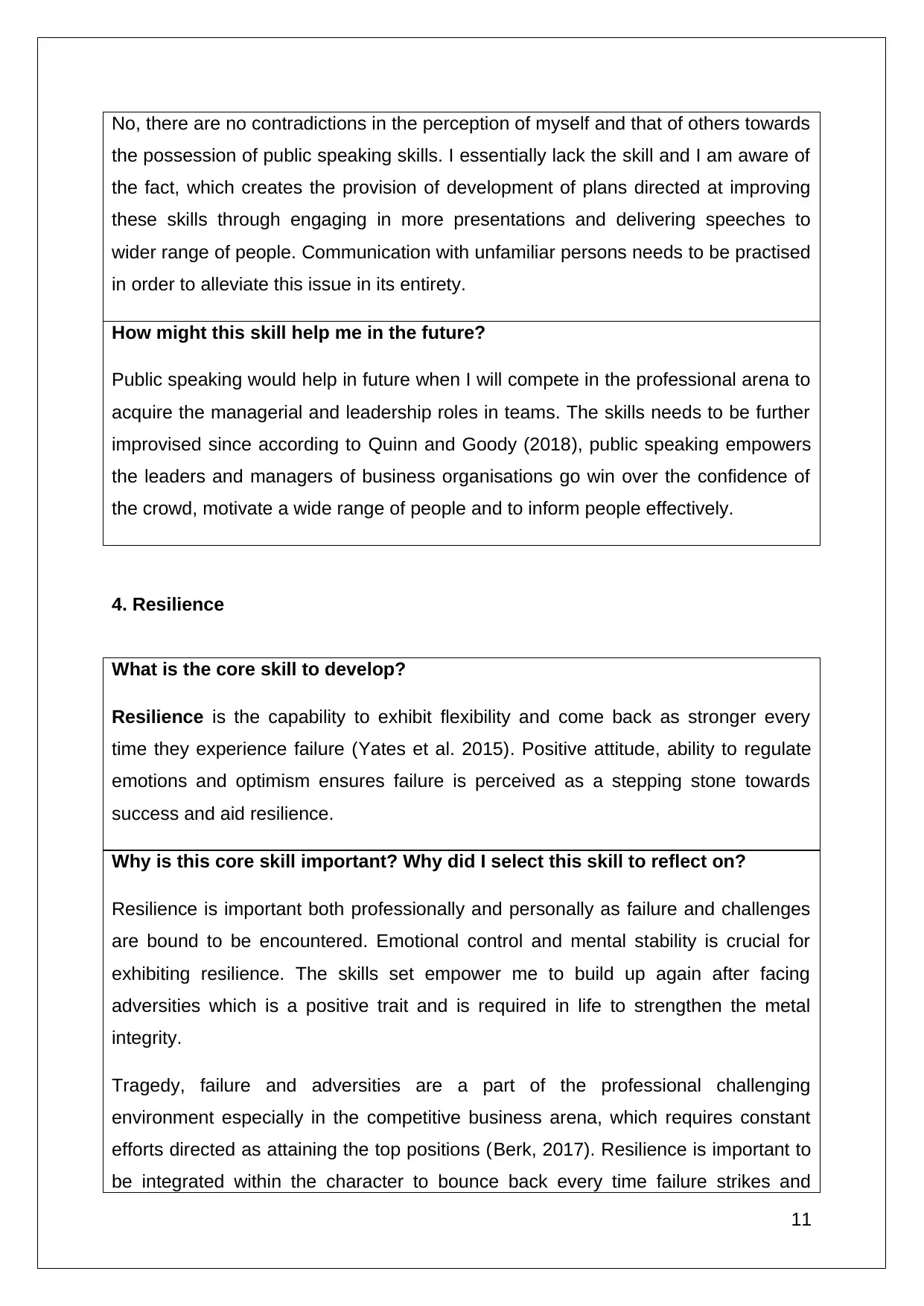
No, there are no contradictions in the perception of myself and that of others towards
the possession of public speaking skills. I essentially lack the skill and I am aware of
the fact, which creates the provision of development of plans directed at improving
these skills through engaging in more presentations and delivering speeches to
wider range of people. Communication with unfamiliar persons needs to be practised
in order to alleviate this issue in its entirety.
How might this skill help me in the future?
Public speaking would help in future when I will compete in the professional arena to
acquire the managerial and leadership roles in teams. The skills needs to be further
improvised since according to Quinn and Goody (2018), public speaking empowers
the leaders and managers of business organisations go win over the confidence of
the crowd, motivate a wide range of people and to inform people effectively.
4. Resilience
What is the core skill to develop?
Resilience is the capability to exhibit flexibility and come back as stronger every
time they experience failure (Yates et al. 2015). Positive attitude, ability to regulate
emotions and optimism ensures failure is perceived as a stepping stone towards
success and aid resilience.
Why is this core skill important? Why did I select this skill to reflect on?
Resilience is important both professionally and personally as failure and challenges
are bound to be encountered. Emotional control and mental stability is crucial for
exhibiting resilience. The skills set empower me to build up again after facing
adversities which is a positive trait and is required in life to strengthen the metal
integrity.
Tragedy, failure and adversities are a part of the professional challenging
environment especially in the competitive business arena, which requires constant
efforts directed as attaining the top positions (Berk, 2017). Resilience is important to
be integrated within the character to bounce back every time failure strikes and
11
the possession of public speaking skills. I essentially lack the skill and I am aware of
the fact, which creates the provision of development of plans directed at improving
these skills through engaging in more presentations and delivering speeches to
wider range of people. Communication with unfamiliar persons needs to be practised
in order to alleviate this issue in its entirety.
How might this skill help me in the future?
Public speaking would help in future when I will compete in the professional arena to
acquire the managerial and leadership roles in teams. The skills needs to be further
improvised since according to Quinn and Goody (2018), public speaking empowers
the leaders and managers of business organisations go win over the confidence of
the crowd, motivate a wide range of people and to inform people effectively.
4. Resilience
What is the core skill to develop?
Resilience is the capability to exhibit flexibility and come back as stronger every
time they experience failure (Yates et al. 2015). Positive attitude, ability to regulate
emotions and optimism ensures failure is perceived as a stepping stone towards
success and aid resilience.
Why is this core skill important? Why did I select this skill to reflect on?
Resilience is important both professionally and personally as failure and challenges
are bound to be encountered. Emotional control and mental stability is crucial for
exhibiting resilience. The skills set empower me to build up again after facing
adversities which is a positive trait and is required in life to strengthen the metal
integrity.
Tragedy, failure and adversities are a part of the professional challenging
environment especially in the competitive business arena, which requires constant
efforts directed as attaining the top positions (Berk, 2017). Resilience is important to
be integrated within the character to bounce back every time failure strikes and
11
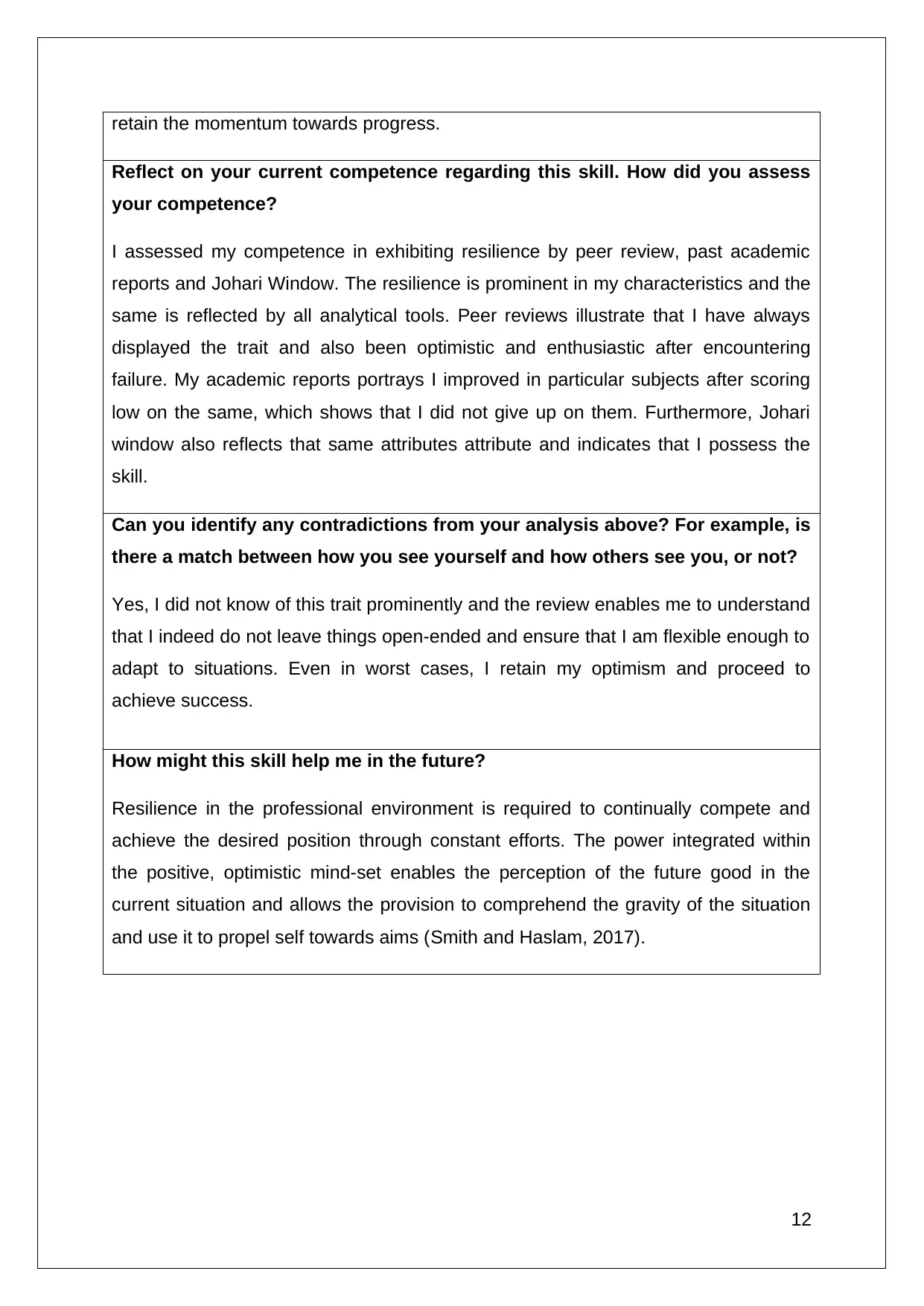
retain the momentum towards progress.
Reflect on your current competence regarding this skill. How did you assess
your competence?
I assessed my competence in exhibiting resilience by peer review, past academic
reports and Johari Window. The resilience is prominent in my characteristics and the
same is reflected by all analytical tools. Peer reviews illustrate that I have always
displayed the trait and also been optimistic and enthusiastic after encountering
failure. My academic reports portrays I improved in particular subjects after scoring
low on the same, which shows that I did not give up on them. Furthermore, Johari
window also reflects that same attributes attribute and indicates that I possess the
skill.
Can you identify any contradictions from your analysis above? For example, is
there a match between how you see yourself and how others see you, or not?
Yes, I did not know of this trait prominently and the review enables me to understand
that I indeed do not leave things open-ended and ensure that I am flexible enough to
adapt to situations. Even in worst cases, I retain my optimism and proceed to
achieve success.
How might this skill help me in the future?
Resilience in the professional environment is required to continually compete and
achieve the desired position through constant efforts. The power integrated within
the positive, optimistic mind-set enables the perception of the future good in the
current situation and allows the provision to comprehend the gravity of the situation
and use it to propel self towards aims (Smith and Haslam, 2017).
12
Reflect on your current competence regarding this skill. How did you assess
your competence?
I assessed my competence in exhibiting resilience by peer review, past academic
reports and Johari Window. The resilience is prominent in my characteristics and the
same is reflected by all analytical tools. Peer reviews illustrate that I have always
displayed the trait and also been optimistic and enthusiastic after encountering
failure. My academic reports portrays I improved in particular subjects after scoring
low on the same, which shows that I did not give up on them. Furthermore, Johari
window also reflects that same attributes attribute and indicates that I possess the
skill.
Can you identify any contradictions from your analysis above? For example, is
there a match between how you see yourself and how others see you, or not?
Yes, I did not know of this trait prominently and the review enables me to understand
that I indeed do not leave things open-ended and ensure that I am flexible enough to
adapt to situations. Even in worst cases, I retain my optimism and proceed to
achieve success.
How might this skill help me in the future?
Resilience in the professional environment is required to continually compete and
achieve the desired position through constant efforts. The power integrated within
the positive, optimistic mind-set enables the perception of the future good in the
current situation and allows the provision to comprehend the gravity of the situation
and use it to propel self towards aims (Smith and Haslam, 2017).
12
⊘ This is a preview!⊘
Do you want full access?
Subscribe today to unlock all pages.

Trusted by 1+ million students worldwide
1 out of 20
Related Documents
Your All-in-One AI-Powered Toolkit for Academic Success.
+13062052269
info@desklib.com
Available 24*7 on WhatsApp / Email
![[object Object]](/_next/static/media/star-bottom.7253800d.svg)
Unlock your academic potential
Copyright © 2020–2026 A2Z Services. All Rights Reserved. Developed and managed by ZUCOL.



